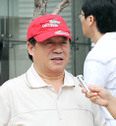Yielding to the pressure from the Chinese Communist Party (CCP), the Korean government deported three Falun Gong practitioners on July 1st and July 8th, 2009. Two more Falun Gong practitioners restrained in Korea are facing deportation. The international community is appalled and bewildered.
The legal field holds that the forced deportation is in violation of the United Nations Convention on the Status of Refugee and Convention Against Torture, as well as the Korean Immigration Law. The general public also thinks the Korean government shouldn't deport Falun Gong practitioners based on humanitarian considerations. Human rights advocates found it shocking and incomprehensible for a democratic country to deport Falun Gong refugees.
Renowned human rights lawyer and recipient of the Order of Canada Mr. David Matas said it was very strange. The CCP forcefully deports Koreans out of the north in violation of the Refugee Convention. Korea forcefully deports Falun Gong refugees in violation of the same convention. It was certainly hard for the CCP to follow the convention, but it shouldn't be hard for a democratic country such as Korea. It would be important for the Korean people to oppose the deportation. Korean human rights lawyer Mr. Kim Namjun said the Falun Gong practitioners should receive humanitarian help even without asylum. Before the deportation, Korean government officials generally thought deportation would not happen though the Korean government were under the CCP's diplomatic pressure.
The two Falun Gong practitioners facing deportation are currently under detention. Their application for asylum had been rejected earlier. One of them is ethnic Korean and is qualified for Korean nationality, but couldn't return to China to get related certification due to the persecution of Falun Gong. The incident received international attention. It was reported that the US government is holding a discussion with the Korean government.
There was indication that the CCP's pressure was behind the decision of the two earlier deportations. News sources said the decision of secretive deportation was not from officials of the Department of Justice, but from higher up, which received pressure from the CCP.
Mr. Zhang, a tourist from Taiwan, said Falun Gong is a spiritual practice. Deportation of Falun Gong practitioners shouldn't have happened in a democratic country. The Korean government shouldn't have yielded for its interest. It should have protested them if it had stood on the side of truth. Human rights and morality should be priority.
Businessman Mr. Kim said, "I have learned about Falun Gong from the newspaper. As a democratic country, we should protect them. Our government should rescue the deported the Falun Gong practitioners. Based on humanitarianism, our government should understand it. What the government did (deportation) wasn't good. All citizens of our country should work together to correct the back-set of democracy."
Mr. Park, who works in the finance field, said, "It isn't right for a democratic country to deport the refugee applicants when it knows they will be persecuted. It isn't right to do because of humanitarianism. Though under pressure, the Korean government shouldn't have deported Falun Gong practitioners for humanitarian reasons. Though China and Korea has economic ties, it is absolutely wrong to forcefully deport these people under pressure. It isn't right for the CCP to persecute Falun Gong out of its own political need."
Evidence shows the CCP had interfered with the 32 Falun Gong practitioners' application for asylum and appeal process. During the visit of Li Changchun, standing committee member of the CCP's Politburo, he clearly signaled the Korean government to drive Falun Gong practitioners out of Korea. Shortly after his visit, the Justice Department began to reject Falun Gong practitioners' application for asylum.
* * *
You are welcome to print and circulate all articles published on Clearharmony and their content, but please quote the source.













 more ...
more ...